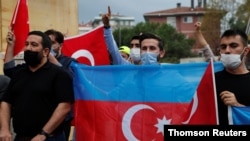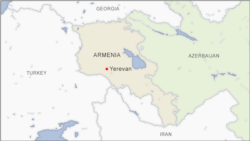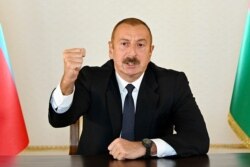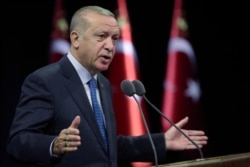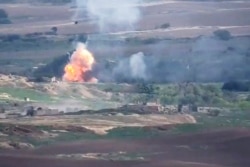Several hundred Syrian fighters have been sent by Turkey to support Azerbaijan in its ongoing conflict with Armenia, according to a war monitor and a Syrian rebel commander.
The Syrian Observatory for Human Rights, which has researchers across Syria, said over 300 Syrian fighters have been deployed to Azerbaijan, Turkey’s longtime ally.
“These Syrian fighters come from two ethnic Turkmen armed groups, including the Sultan Murad Division and the Suleyman Shah Brigade,” Rami Abdulrahman, director of the Syrian Observatory, told VOA in a phone interview Tuesday.
The two Turkish-backed Syrian rebel groups have been important actors in Turkish-controlled areas of northern Syria.
Ziad Hajj Obeid, a commander with the Turkish-backed Syrian National Army, told Rudaw TV, a Kurdish TV channel in Iraqi Kurdistan, on Monday that there are two reasons Syrian rebels are driven to join the fight in Azerbaijan.
“Obviously, some went to Azerbaijan for financial incentives, but others made the decision out of a sense of duty towards our Turkish allies,” Obeid said, adding that “Turkey has been our main supporter in Syria, and we’re simply returning the favor.”
Two Syrian fighters interviewed by the Reuters news agency said they had been told by their Syrian brigade commanders they would earn around $1,500 a month. VOA could not independently verify this information.
Clashes over the territory of Nagorno-Karabakh, which started Sunday, have left dozens of people dead and hundreds wounded. Observers say the latest fighting over the largely ethnic Armenian enclave in Azerbaijan is the worst since the 1990s.
Denied claims
News about this development first came from Armenia’s ambassador to Russia on Monday, who said Turkey had sent around 4,000 fighters from northern Syria to Azerbaijan.
Azerbaijani President Ilham Aliyev denied such claims, telling Russian-1 TV, a state-owned Russian news channel, that it was “fake news.”
Hami Aksoy, the spokesperson for the Turkish Foreign Ministry, has reportedly called the allegations “baseless.” An official with the ruling Justice and Development Party (AKP) has denied the allegations.
In a tweet on Monday, Omer Celik, spokesperson for the AKP, described the claims as lies and a provocation against Turkey.
Turkish support
Turkey said it will support Azerbaijan with all means necessary, as Turkish President Recep Tayyip Erdogan expressed his country’s support for Azerbaijan, calling Armenia “the biggest threat to peace in the region.”
The Armenian government on Monday said Turkish military “experts” were “fighting side by side with Azerbaijan.” Turkey has denied those accusations.
Fariz Ismailzade, a vice-rector of ADA University in Baku, said Azerbaijan doesn’t need mercenaries “because we have a professionally trained army.”
“Turkey provides moral and political support but is not a party to the conflict and doesn’t send any military units,” he told VOA.
“So far, Azerbaijan has used only official army units (and) announced partial mobilization of the reservists,” Ismailzade added.
Role of Syrian fighters
Ankara has previously used Syrian militias in the Libyan conflict. Turkey sent between 3,500 and 3,800 paid Syrian fighters to Libya in early 2020, according to a July report by the U.S. Defense Department’s inspector general.
The deployment was part of Turkey’s efforts to support the Tripoli-based Government of National Accord (GNA) against forces loyal to commander Khalifa Haftar. Despite an arms embargo imposed on Libya by the United Nations, Turkey has also supplied drones and an air defense system to the U.N.-recognized GNA.
The deployment of Syrian militias by Turkey reportedly played a role in changing the course of Libya’s war, but experts don’t believe that would be the case in the Armenian-Azerbaijani conflict.
“Nagorno-Karabakh is a mountainous region, and fighting in the mountains is not the same as on the streets,” said Yeghia Tashjian, a Beirut-based expert on the Caucasus region.
“Many (Syrian) fighters aren’t prepared for this,” he told VOA. “Some of them fought in Libya where the weather is hot or even in (Syria’s) Idlib, where it’s not very cold compared to Nagorno-Karabakh.”
Abdulrahman of the Syrian Observatory said given the small number of Syrian fighters sent to Azerbaijan, their deployment is merely a symbolic move by Ankara.
Matthew Bryza, a former U.S. ambassador to Azerbaijan and now a senior fellow at the Atlantic Council, could not confirm if reports about the presence of Syrian fighters were accurate, but noted that the “mercenary situation” in Syria is a “tragic reflection of economic desperation.”
“Because these are individual decisions (to fight), they are not political decisions,” he told VOA. “I don’t think there will be a political impact of those decisions unless for some reason Turkey was able to force people to go from Syria to Azerbaijan to fight.”




